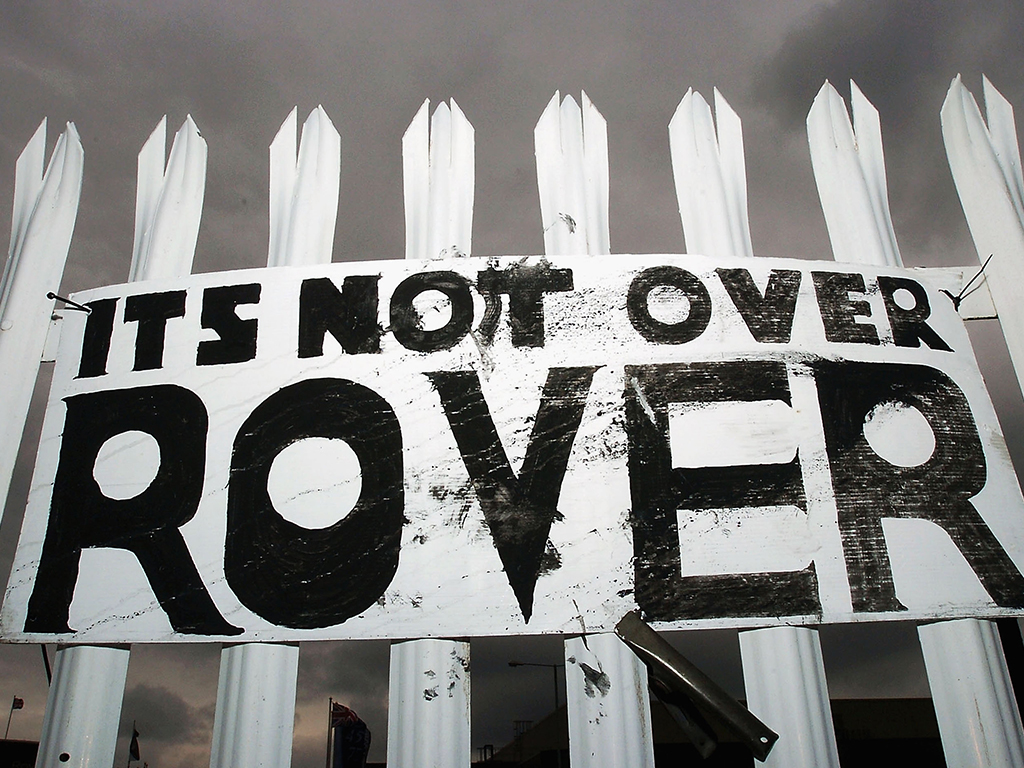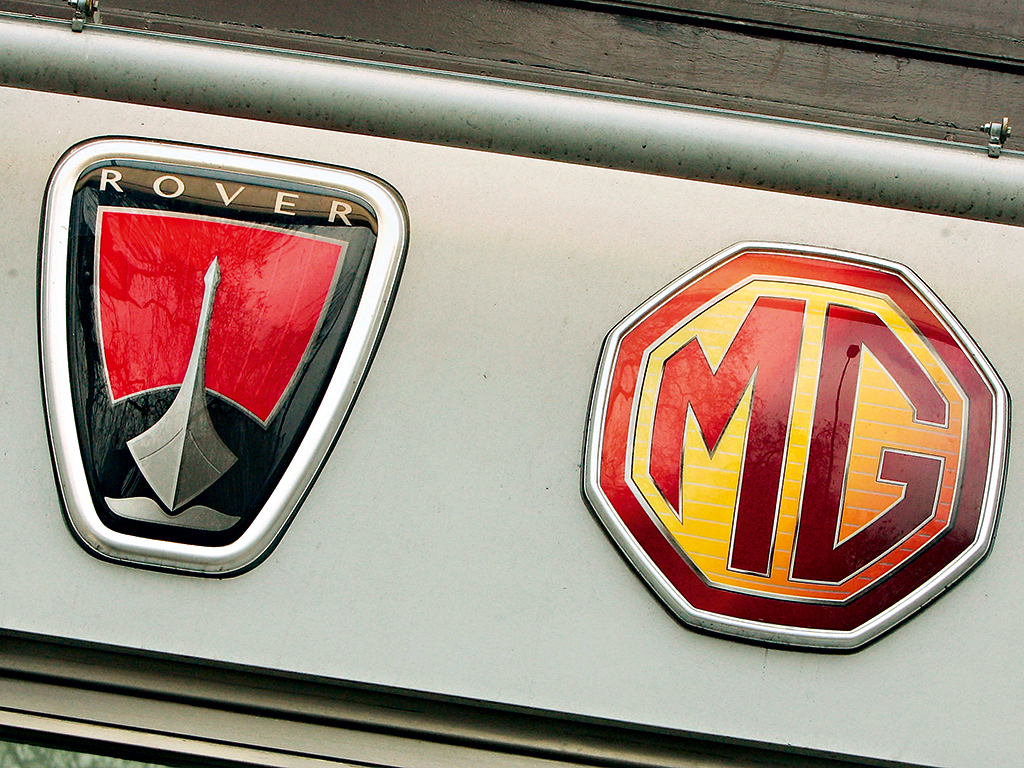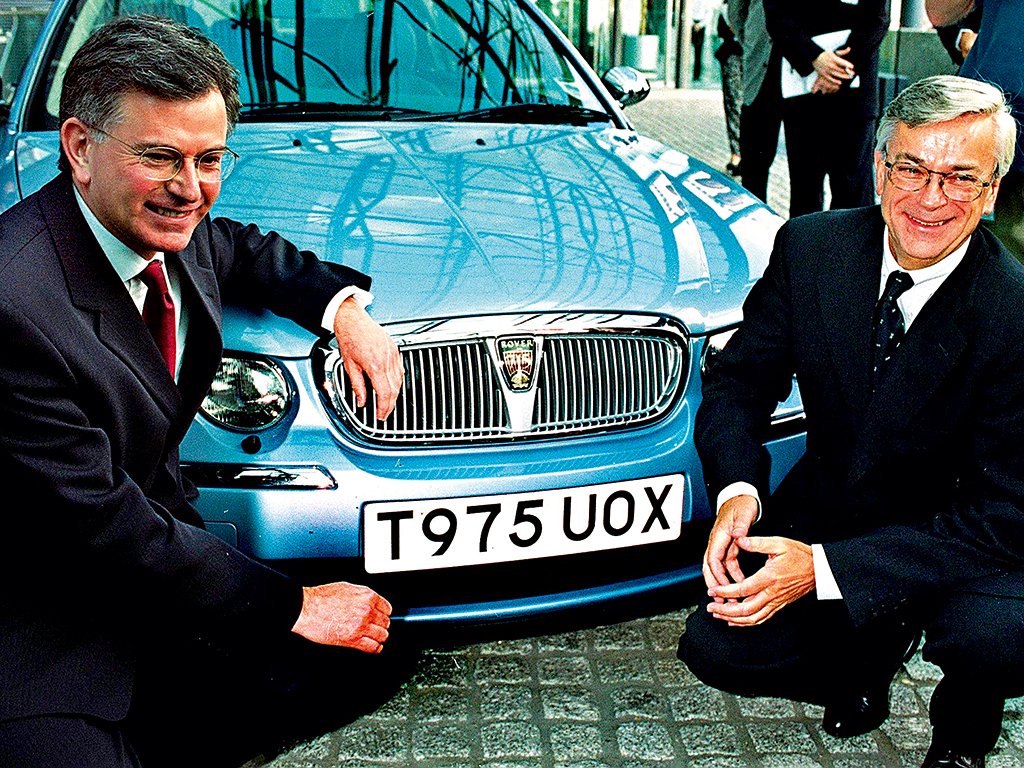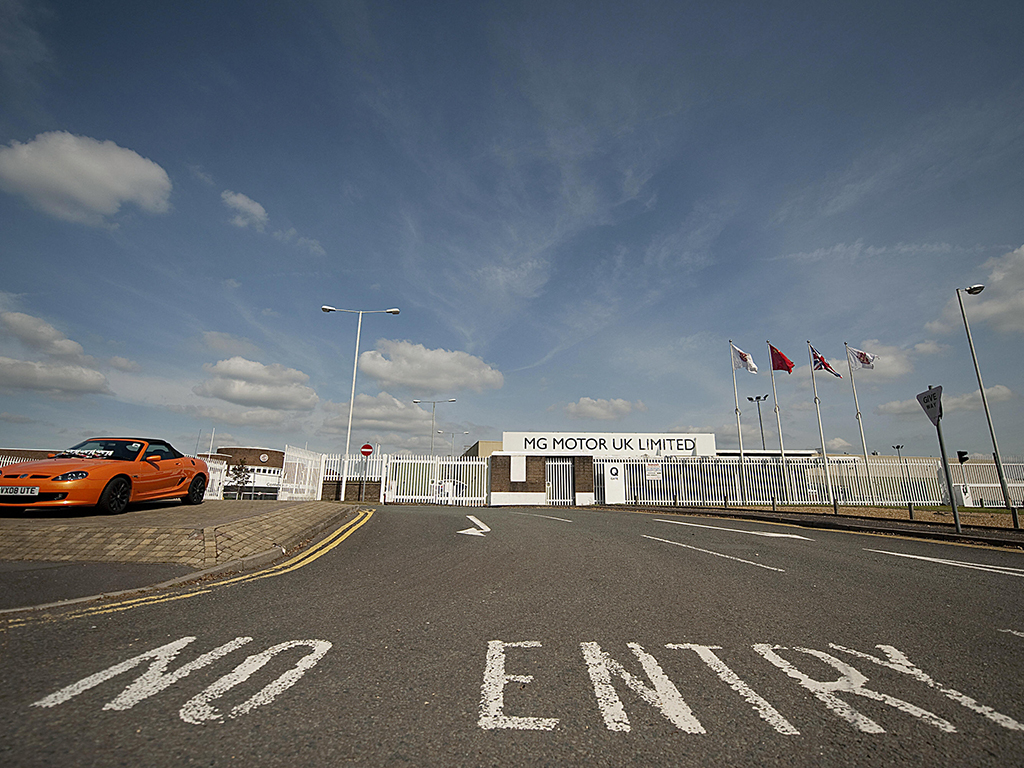
When Deloitte was fined over £14m in 2013 over its involvement as accountants in the winding down of MG Rover, the cycle was complete. After 20 years of mismanagement, and a whole eight years since the messy dismantling of what was once one of Britain’s finest manufacturing institutions, finally there was someone to blame – at least partially.
Since MG Rover was sold off for scraps in 2005, leading to 6,000 workers losing their jobs and the exponential enrichment of its owners, there have been a number of public enquiries, which culminated last year with the Financial Reporting Council (FRC) fining Deloitte.
The legend of the Phoenix

Also known as Phoenix Venture Holdings, the Phoenix Consortium was comprised of four businessmen – John Towers, Peter Beale, Nick Stephenson, and John Edwards. The consortium was founded with the express view of acquiring MG Rover from BMW in 2000, as the German manufacturer sought to rid itself of the loss-making manufacturer.
The Phoenix Four, as they became known, struck a deal with BMW after government interference in their favour. The Transport and General Workers Union, and the British general public also supported Phoenix’s offer to BMW, because it promised to secure jobs through the acquisition process and as the company was restructured.
Because of UK regulations that ensure that former owners can be held accountable for possible bankruptcies that might occur within the first three years after a sale, BMW paid Phoenix £500m, as an interest free loan, to get the company back on its feet. It later emerged that the funds had been misallocated and the loan had to be written off.
As MG Rover collapsed, the Phoenix Four had enriched themselves and their families and despite bowing out of the business in utter ignominy, have retired to a life of comfort after sharing the spoils obtained from their failed venture.
This final ruling is unlikely to bring solace to the embattled former employees, and if anything only serves to shift some of the blame from the shoulders of the four businessmen known as the Phoenix Four.
A report published in the wake of the closures that investigated the collapse of the once-powerful company uncovered evidence of bribery, sophisticated tax-avoidance schemes, and the use of evidence elimination software.
It is clear that towards the end MG Rover was a company rotten to the core and totally bankrupt. The only question that is yet to be answered is how it was allowed to get this way, after government and trade unions interfered on behalf of workers supposedly to ensure there would be no job losses.
Fools gold
When BMW bought the Rover Group – as it was then called – in the early 90s, the company was already struggling with productivity and rapidly declining market share. Indeed, the Land Rover was the only profitable segment of the business and BMW struggled to turn it around.
After some years of almost constant losses, BMW threw in the towel in 2000 and sold Rover off. Land Rover went to Ford, the MINI series was relaunched successfully under the BMW banner and the rest, all that would become the problematic MG Rover Group, was up for grabs. At the time it was the last British-owned volume car manufacturer, and it would not last much longer.
Initially BMW announced that venture capital group Alchemy would be taking over Rover. Alchemy had put forward a credible business plan that might have brought Rover back from the brink. The idea was to focus on the MG sports car segment of the business, which had remained somewhat viable. There would be job losses, but Alchemy had guaranteed a £50,000 redundancy package to every man and woman laid off, as well as a clear chance of bringing people back on board after the company’s health was restored.
However, there was widespread outcry. Trade unions got involved, and the government was forced to intervene. While concerns about substantial job losses were not unfounded, the government’s interference might have contributed to the company’s eventual downfall.
The government’s chief argument was that MG Rover was a ‘volume’ car manufacturer – and the last British one at that – and to strip it down essentially to a boutique sports car producer would be nothing short of criminal. Trade Secretary for the incumbent Labour government, Stephen Byers sided with the trade unions and the deal between Alchemy and BMW stalled.
From Phoenix back to ashes
Enter the Phoenix Consortium – a group of four local businessmen who joined forces with the sole purpose of taking over MG Rover and rehabilitating it as a manufacturing powerhouse. Led by John Towers, the group consisting of Nick Stephenson, Peter Beale and John Edwards, appeared as if out of thin air with a counter-offer to what Alchemy had been proposing.
Jobs would be spared. Promises were made to maintain the volume of vehicles produced at 200,000 a year – low by industry standards, but beyond what Rover had been managing for quite some time. Byers intervened again. There was enormous public pressure for BMW to accept the Phoenix bid, in lieu of the Alchemy one, even though there were mutterings that the Phoenix pitch was not entirely viable in the long run.
For BMW, MG Rover was going from a burdensome asset to a toxic problem. The involvement of the government and the vocal trade unions meant the German manufacturer was keen to resolve the situation as quickly and painlessly as possible.
Found a Byers

Stephen Byers joined the Labour cabinet under Tony Blair as Secretary for Trade and Industry in 1998, and was compelled to intervene in the burgeoning MG Rover deal between BMW and venture capital firm Alchemy, when it transpired over 4,000 jobs would be lost.
He advocated for BMW to consider a late bid by the Phoenix Consortium that would spare numerous jobs, even as some pointed out that their business plan was incomplete and potentially unviable at the time of the sale. Byers himself has declared he was the one to introduce John Towers to BMW, and spoke favourably of the now reviled businessman in Parliament in the wake of the deal.
Many credit Byers with forcing BMW’s hand in the sale, and the former secretary has been relentlessly criticised for his role in the whole process. He went on to court more controversy for his involvement in Railtrack’s failure in 2001 before retiring from political life in 2010.
In a few months MG Rover had gone from a bad asset BMW were looking to divest, to a substantial political problem. So BMW was forced to review its stance and finally hear the Phoenix Consortium’s bid. Eventually, BMW relented, Alchemy bowed out, and the Phoenix Consortium acquired MG Rover for a nominal fee of £10, and secured a £427m soft loan to put it back on four wheels.
Though the sale had gone through, and jobs had been spared, at least for the time being, Byers was relentlessly criticised, but stood his ground. In the end, thanks to the trade secretary, Phoenix’s bid was put together and finalised in less than a month.
“Three weeks ago when I got the [John] Towers Consortium together with BMW and facilitated their first meeting, I was criticised in many quarters for getting involved in that way,” Byers told the BBC at the time. “I think we were right then and I think today we are seeing the results of that.”
Because the deal had become politically charged with the involvement of the trade unions, the Phoenix takeover was largely welcomed because it meant the company would remain in British hands and jobs would be saved. However, in less than five years MG Rover would have shut down permanently, its assets stripped, its employees dismissed – and crucially – its owners made extremely wealthy.
Spare parts
Within a couple of years, the Phoenix Consortium had started stripping down MG Rover for parts. It soon became undeniably clear what many had suspected all along – their business plan simply did not hold water.
The £427m soft loan designed to help bring the company back to its feet was squandered. The freehold of the MG Rover factory in Longview was sold off to a property developer for £74m; the components business went for £100m; the Shanghai Automotive Industrial Corporation of China bought the rights to Rover’s engines; and the profitable customer service division was incorporated by another business owned by the Phoenix Four businessmen.
During this time, the owners awarded a pension fund for themselves and their families worth a jaw-dropping £16m. They also awarded themselves generous bonuses – allegedly agreed to during a luxury beach holiday the men took together – even as the company was crashing round their ears.
In total the Phoenix Four, now known more as a gang than as a consortium of executives, paid themselves over £42m. By the time Rover collapsed in 2005, the company had been saddled with over £1bn worth of debt.
But the overcompensation of the executives, though deeply shocking, was only the tip of the iceberg when it came to the corruption that had implanted itself at the heart of Rover.
A government enquiry reported that Beale purchased software called Evidence Eliminator in order to prepare for the inevitable investigation into the company’s accounts. The software “quickly and professionally deep cleans your computer of ‘sensitive material’, leaving you with a clean PC, a clean conscience and instant peace of mind”, according to the software’s own website.
Before BMW

Formerly known as Leyland Motoring Company, then as the Rover group, the company had been bought, sold and merged in a number of times before BMW acquired it from British Aerospace in 1994.
Between 1990 and 1993 the workforce had been drastically reduced from 44,000 to a mere 32,000, which produced and inefficient 14 cars per worker annually.
The company continually sustained heavy losses, with the operating profits coming from the four-wheel drive range. However, when BMW took it over the company was certainly on an upward trend, slowly becoming more efficient and regaining market share.
Despite BMW’s ambitious plans, recovery never took hold. It was clear that Rover was failing as a brand and stuck with an old manufacturing model. After just six years, BMW was forced to cut its losses and sell off.
The investigation uncovered the supposedly deleted files, including details of tax arrangements and benefits received by Towers and other executives. When questioned about it, Beale changed his story repeatedly, and denied remembering that he had purchased and installed any such software.
Fines and failures
But perhaps most damning of all was evidence that uncovered a deeply problematic tax arrangement devised by Techtronic (MG Rover’s holding company), Deloitte and Barclay’s bank in 2000. The arrangement, known as Project Slag, supposedly short for stock lending agreement, would have earned the company $60m, and an additional £42m for Barclays had it not been blocked by Inland Revenue.
Deloitte also failed to disclose a conflict of interest which arose when “they proposed a contingent fee of £7.5m and a five percent equity stake in the company to be owned by the Phoenix Four and in so doing failed to adequately identify, consider and safeguard against the self-interest threat that Deloitte had an interest in completing the transaction, earning a large contingent fee and acquiring an interest in the venture”, read a FRC report.
A report into the auditors involvement in the matter concluded that Deloitte had aided the executive even as it became apparent “that the Phoenix Four had decided that they wanted to secure the profits for themselves and not for [MG Rover]”.
Deloitte was also involved in a further incident with MG Rover and Barclays known as Project Aircraft. This scheme involved MG Rover leasing two Boeing aircraft with the idea of using the car manufacturer’s losses to mitigate tax liabilities for the purchase of the aircraft.
It was successful, with a company owned by the Phoenix Four pocketing over £10m from the arrangement, all paid to holding companies in Guernsey. In 2013, when the FRC fined Deloitte, it also banned former partner Magshoud Einollahi from accounting for three years, and fined him an additional £250,000 for his role in the deal.
It is a greater fine than any of the Phoenix Four members were ever given. And though the government enquiry found that the Phoenix Four had plans to pocket over $75m from MG Rover over five years, they only walked away with £11.6m of assets, though they faced no real sanctions for their actions.
Rover and out
Despite further evidence of bribery, particularly pertaining to the sale of the Longbridge factory to St Mowden Properties, and the claim that business decisions were taken within MG Rover on an informal basis, with no regular board or executive meetings and a shocking lack of transparency, the Serious Fraud Office decided there was no solid evidence to bring criminal charges onto the Phoenix Four.

Instead, the four culprits were disqualified from leading companies in Britain for close to two decades. Three of the four phoenixes have retired to a life of luxury, while Stephenson has gone on to head another car company in Florida.
However, compared to the 6,300 workers they laid off when MG Rover went bust with nothing but a paltry £3,400 redundancy payment, the Phoenix Four have done extremely well for themselves. Though Deloitte was fined and the four directors banned from running business, there is no undoing the world of harm the Phoenix Four – enabled at least in part by the government of the time and the trade unions – inflicted upon a community and the irreparable damage they caused the British automotive industry.
A number of questions will likely be left unanswered as the greatest scandal of modern British industry fades into nothing more than a collection of bad memories.

